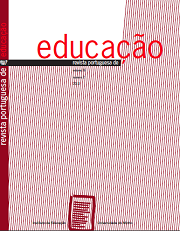Avaliação da competência comunicativa oral no Ensino Básico: Um estudo exploratório
DOI:
https://doi.org/10.21814/rpe.3248Resumo
A competência comunicativa oral compreende as habilidades verbais, paraverbais e não-verbais usadas para comunicar em diferentes contextos. O presente estudo sustenta o uso sistemático de uma grelha de observação em sala de aula, útil para promover a formação de leitores fluentes e competentes. A amostra foi constituída por 82 alunos do 7.º (N=61) e do 9.º
(N=61) anos de escolaridade, que foram observados com recurso à grelha de Registo de Observação e Avaliação da Competência Comunicativa Oral (Monteiro, 2011a). Esta grelha apresenta três componentes da comunicação: verbal, paraverbal e não-verbal. Em termos da fiabilidade da medida, os resultados demonstram que as cotações dos professores e investigadora para a competência comunicativa oral global e para as habilidades de comunicação verbal e paraverbal estão significativamente associadas, revelando um bom acordo interjuízes. Embora os alunos do 9.º ano apresentem resultados ligeiramente superiores aos do 7.º ano, a competência
comunicativa oral não difere significativamente entre estes dois grupos (U<995,000, p>0,058). Verificou-se, contudo, que os alunos com melhor realização escolar em Língua Portuguesa revelam melhor competência comunicativa oral [rs=0,559 (p<0,001)].
Palavras-chave
Competência comunicativa oral; Grelha de registo de observação e avaliação; Língua Portuguesa; Ensino Básico
Downloads
Downloads
Como Citar
Edição
Secção
Licença
1. Autores conservam os direitos de autor e concedem à revista o direito de primeira publicação, com o trabalho simultaneamente licenciado sob a Licença Creative Commons Attribution 4.0 CC-BY-SA que permite a partilha do trabalho com reconhecimento da autoria e publicação inicial nesta revista;
2. Autores e autoras têm autorização para assumir contratos adicionais separadamente para distribuição não-exclusiva da versão do trabalho publicada nesta revista (ex.: depositar em repositório institucional ou como capítulo de livro), com reconhecimento de autoria e publicação inicial nesta revista;
3. Autores e autoras têm permissão e são estimulado/as a publicar e distribuir o seu trabalho online (ex.: em repositórios institucionais ou na sua página pessoal), já que isso pode aumentar o impacto e a citação do trabalho publicado (Veja O Efeito do Acesso Livre).
Esta obra está licenciada sob uma Licença Creative Commons - Atribuição Compartilhamento pela mesma Licença Internacional 4.0




















